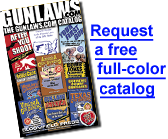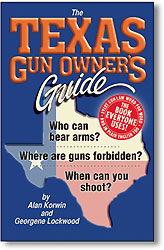
| Home | Books | National Directory | Position Papers | Alan’s Blog | FAQ | New Stuff | Search |
|
UPDATES
THE TEXAS GUN OWNER'S GUIDE Updates for 2005—2006
COMPREHENSIVE LIST of all 83 changes in the Sixth Edition (Posted 8/06)
13 NEW GUN LAWS IN TEXAS - 2005 These laws go into effect on Sept. 1, 2005, CHL now good for five years instead of four, non-residents welcome
to apply Half-price sale for CHLs for the military, and elligible at age 18
not 21. Shooting across property lines generally banned Hunting on submerged land redefined No CHL shooting test for qualified military personnel THE BIGGEST CHANGE OF THE YEAR: "Traveling" defined at last, almost, after more than 125
years Half-price sale for CHL renewals for seniors (people over 60) Pay your CHL tax with cash, personal check or credit card "Convicted" does not include some deferred adjudications New shooting limits on rivers and streams in nine counties Officials exempt themselves from carry bans Officials exempt themselves from carry bans Shooting on agricultural land, and limits on city power to regulate
shooting
|
 on gun laws and other topics.
|


